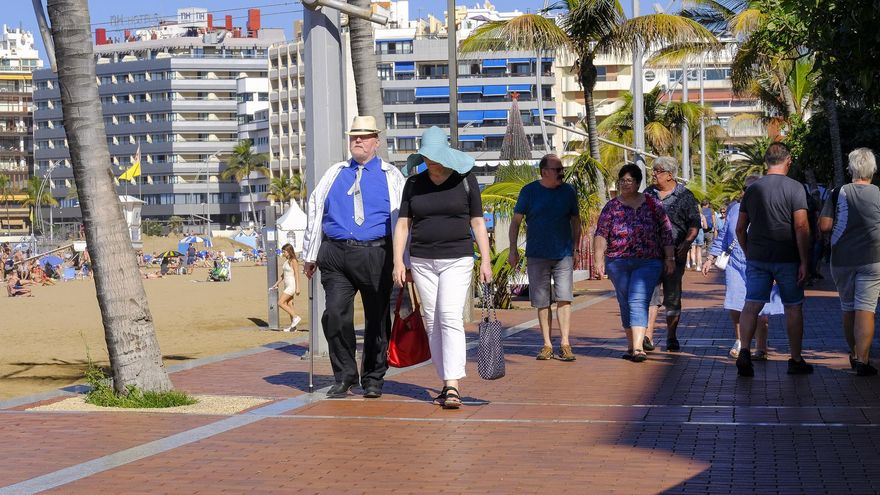
The excitement that arose in the last term, when presenting candidates to host important Spanish and European public agencies and centers with great influence, hasn’t translated into success for the Canary Islands. After losing the candidatures for the Space and Artificial Intelligence agencies promoted by Spain, as well as the ongoing disputes between the islands to become the headquarters, hopes now remain uncertain for the European Tourism Agency and the National Volcanology Center, which was announced to settle in the Canary Islands almost two years ago.
The Minister of Science, Innovation and Universities, Diana Morant, has recently reassured that the five million invested in this organization in the Canary Islands are guaranteed. The funds are included in the State’s general budgets, however, the opening date and the specific island for the volcanological institution are yet to be announced. La Palma and Tenerife are contending for this center. Meanwhile, another hope remains: Gran Canaria becoming one of the venues for the 2030 World Cup.
However, what has happened to the European Tourism Agency, for which Gran Canaria, Tenerife, and Lanzarote were nominated as potential headquarters? Well, it hasn’t even been established. It remains only as an idea on paper.
European Tourism Agency
Despite the approval of the strategy for sustainable tourism in Europe by the European Parliament on March 25, 2021, which included the proposal for a tourism agency, the European Commission has not progressed in creating the new body. Following the Canary Islands’ misses in hosting the Spanish Space Agency and the Artificial Intelligence Agency in December 2022, the then President of the Government, the socialist Angel Victor Torres, who is currently Minister of Territorial Policy and Democratic Memory, had set his hopes for the Islands to be the hosting grounds for the European Tourism Agency, intending to place the Archipelago at the epicenter of community tourism policies.
However, the community Executive has yet to act upon the 2021 EU parliamentary mandate in the current term, despite the upcoming European elections next June. Furthermore, the organization still lacks a budget in the European Union’s financial framework 2021-2027, and unless resources are obtained from a general fund in the coming years, the reality of establishing the agency may have to wait until 2028.
The Canary Islands’ hopes were also tied to Spain assuming the rotating European presidency between July and December 2023, with the expectation that Pedro Sanchez would advocate for the agency’s creation, considering the impending 2024 European elections.
PSOE MEP Juan Fernando López Aguilar insists that all possible pressure was exerted from the European Parliament and the Canarian Government, but the legislative term concludes without the European Commission adopting the Community Chamber’s mandate.
The creation of the European Tourism Agency, thus, remains to be addressed in the subsequent year of the European Commission. Interestingly, tensions had already arisen between Gran Canaria, Tenerife, and Lanzarote competing to host the headquarters, even though the previous Canarian Executive had approved the application for hosting the organization and transferred it to the State.
Furthermore, President Pedro Sánchez committed in the summer of 2021, during his stay in Lanzarote, that the Canary Islands would be Spain’s sole choice to host the future European Tourism Agency. This commitment was solidified in May 2022, when the Canary Islands’ president, during the meetings in Martinique, announced that the Government of Spain had officially supported the Archipelago as the future headquarters of the European Tourism Agency.
The Canarian candidacy was also endorsed by representatives from other outermost regions (ORP) such as France and Portugal. Despite these efforts, the Agency remains unrealized. Anticipating its eventual creation, if that day ever comes, may take years, given the incoming European Commission’s focus on major global issues such as the Ukraine conflict, the energy crisis, or the war in the Middle East, as well as the lack of funds in the 2021-2027 financial framework.
Creation of European Agencies under New European Regulation
In accordance with European regulation, the establishment of European agencies entails the Commission initiating the legislative proposal for setting up the Agency. Subsequently, the Commission develops the regulation outlining the entity’s structure and its board of directors. Typically, the Commission compiles a roster of the top five most qualified candidates for the governing body, and the European Council makes decisions regarding both the proposals for the headquarters put forth by each country and the final candidates for the governing body. Despite the progress made by the Canary Islands, it remains uncertain whether Spain will host the Agency or if it will materialize under the new European Commission.
Spanish Space Agency and Artificial Agency
The bid for the Canary Islands to become the host of the Spanish Space Agency experienced several ups and downs. Despite generating high expectations, the submission of three proposals by the island councils of Gran Canaria, Tenerife, and Fuerteventura created division, potentially impeding the designation of the headquarters for the Canary Islands. Some experts criticized the lack of a unified candidacy. As for the Artificial Agency, only Tenerife submitted a proposal. Gran Canaria initially emerged as the frontrunner among the three islands with support from the regional government for its prepared proposal. However, it ultimately remained among the candidates with technical feasibility, alongside Tres Cantos (Madrid), San Javier (Murcia), and Zamudio (Basque Country), falling behind Seville and Elche. In December 2022, disappointment ensued: Seville secured the Spanish Space Agency, with the Council of Ministers deciding on its location, while A Coruña claimed the Artificial Intelligence Agency for which Tenerife was contending.
Establishment of Volcanology Center
As of two years ago, discussions arose about the potential location of the National Volcanology Center, following the eruption of the Tajogaite volcano in the municipality of El Paso, La Palma, on September 19, 2021. The central government has allocated a budget of five million, yet a definitive decision is still pending. The uncertainty surrounding the center’s location poses a challenging situation for the excluded island, while the fate of the center remains undetermined.
















